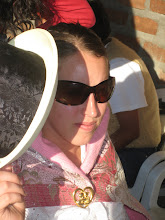Apathy about the violence and corruption in Honduras is, in my opinion, one of the largest stumbling blocks toward development. The population is largely passive and people merely shrug their shoulders in the face of blatant abuse or mismanaged funds. In Honduras, it’s every man for himself and few people are willing to work for the common good. The rich ensure the continuing corruption while the poor often act as pawns, making it difficult to point fingers. Yet, people are pointing fingers left and right, placing the blame, sometimes on foreign players like the United States.
The teachers of Honduras were on strike for more than 3 weeks in August, halting classes across the country. The government institution in charge of managing the teachers’ pension had embezzled millions of lempiras, so the teachers protested until they arrived at a solution. Perfectly acceptable. However, consider this: teachers are some of the most highly-paid professionals in Honduras, they pay no income taxes, are given instant tenure, and many work only half the day. Ninety percent of the education budget in Honduras goes toward salary. To teach at the primary school level only a high school education is required. I’m sure there are some excellent, first-class teachers somewhere in the public school system of Honduras, but I have yet to meet them. The curriculum they use is antiquated and unchallenging. With no fear of losing their jobs and no pressure to achieve academic excellence, some teachers, if not most, are downright lazy, encouraging lazy, underperforming students. Yet, the only thing the teachers are willing to protest for is the money which they probably don’t even deserve. It’s a case of teachers pointing fingers at the government when teachers are not completely blameless themselves. I have yet to see a teacher protest to have the education system overhauled or the budget reworked in favor of the students.
It’s also difficult to point fingers when the majority of the population has no legal recourse. For those who have the money to pay bribes, etc. there is a certain amount of security, but, for the poor it is basically non-existent. Violence is accepted by the system. Take the police report we filed after being robbed–nothing will ever come of it. Fortunately, what was taken from us will not impact our lives. However, numerous people in my site have had their entire profits from a coffee harvest stolen, a loss which is surmountable but a major hardship. It may be the difference between educating their kids and not. Others have lost their lives.
The situation in Honduras won’t change instantly, as proven by the antiquated education system which is only pushing them backwards. The population is also numb to the violence. Graphic photos of murders are just as likely to make the front page of the newspapers as any given politician. One man, when I told him about the robbery said, “Well, at least you weren’t murdered.” But, in order to change, I am of the opinion that the violence and corruption must be reined in and Hondurans must start pointing fingers at themselves.
Friday, September 10, 2010
Subscribe to:
Post Comments (Atom)

1 comment:
Tragic. Education is imperative, and it sounds like the teachers and communities are not doing their job to help kids learn. Sad.
Post a Comment